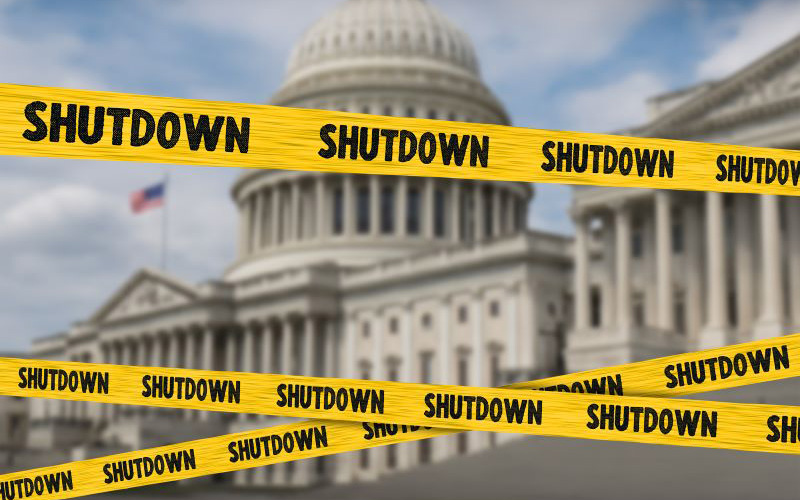Government Shutdown: What Credit Unions Need to Know
Posted by Jess Honcoop on October 1, 2025

As of midnight, the federal government is in a partial shutdown. Last week, we shared the GoWest Government Shutdown Resource Center with the hope that Congress could finalize a deal by the funding deadline.
With the government entering shutdown for an undetermined amount of time, you’ll want to clearly and consistently communicate with your members who might be impacted by the partial or complete shutdown of government services. Access our Resource Center for talking points, FAQs, and compliance resources.
What a Shutdown Will Mean for Credit Unions
Impacts will be wide-ranging but shouldn’t affect most credit unions’ operations.
Credit unions remain stable and operational during a government shutdown. As member-owned, not-for-profit institutions that prioritize members’ financial well-being, services and support systems will continue uninterrupted.
Without Congressional funding, the determination of which government services are maintained, reduced, or suspended is for the most part subject to the discretion of the Administration, depending on Congressional mandates. However, there are limits to how this will impact credit unions.
Here’s what to expect for government shutdown impacts on credit unions:
- Benefit payments, like social security checks, are usually safeguarded from shutdown-related interruptions; however, customer service-related activities such as card replacements, benefit verifications, and customer support could experience delays due to furloughed staff and reduced operations.
- Most federal agencies will shut down operations except for essential employees that carry out national security, law enforcement, safety, and essential functions, such as TSA and air traffic controllers.
- Some programs in key Administration offices, such as the Small Business Administration, Federal Housing Administration, and the Department of Housing and Urban Development will have a significantly reduced workforce, so loan processing with these agencies could face significant delays.
- During a shutdown, federal employees generally fall into three categories:
- Workers whose salaries are financed through means other than annual government appropriations, and so they continue to work and be paid (i.e. U.S. Postal Services)
- Workers who are furloughed
- Workers who continue to work without pay, also known as “essential” or “excepted” employees
- Neither furloughed nor excepted employees receive pay for the duration of a shutdown, but they have historically been repaid after funding is reestablished and the government reopens.
- Military personnel’s pay could be impacted during a shutdown, but in recent shutdowns, most military pay has been maintained by congressional action.
Important to remember:
- The NCUA, the Federal Reserve, and other federal banking regulators remain open during a government shutdown, regardless of how long the shutdown persists. The NCUA is funded by member credit unions and is not subject to the Congressional appropriations process.
- Credit union share deposits remain insured and secure. The NCUA-administered National Credit Union Share Insurance Fund (NCUSIF) is independent of the federal appropriations process and insulated from any government shutdown.
People Helping People: Credit Unions Are Stepping Up for Their Members
Credit unions were built on the principle of “people helping people.” In a shutdown, you have a unique opportunity to provide reassurance, support, and clarity to your members during times like these.
It’s important to remind members why their choice to bank with a credit union is a smart and secure one, especially during periods of economic disruption. In times of crisis, credit unions across GoWest’s six-state region have consistently demonstrated their commitment to supporting their members.
Are you taking action to help members impacted by the government shutdown? We want to hear about it!
Share your support programs and success stories with Katy Wagnon, SVP of Marketing and Communications. We’d love to feature your credit union’s work for your members in our communications and outreach to elected officials.
The GoWest Advocacy Team is closely monitoring the negotiations as well as working with state and federal regulators to provide operational and regulatory flexibility for your credit union as you work to help your members through a difficult time. If you need further assistance on specific regulatory issues with extending skip-a-pays, credit flexibility options for members, or liquidity challenges, please reach out to John Trull, VP of Regulatory Advocacy.
We encourage you to remain proactive, not only in supporting your members but also in sharing the unique programs and services you offer with community and media partners. Together, as a community of credit unions, we can continue to demonstrate our unwavering commitment to serving our members.
Posted in Across the Region, Advocacy, Arizona, Colorado, Idaho, Oregon, Public Awareness, Regional Member News, Top Headlines, Washington, Wyoming.
















